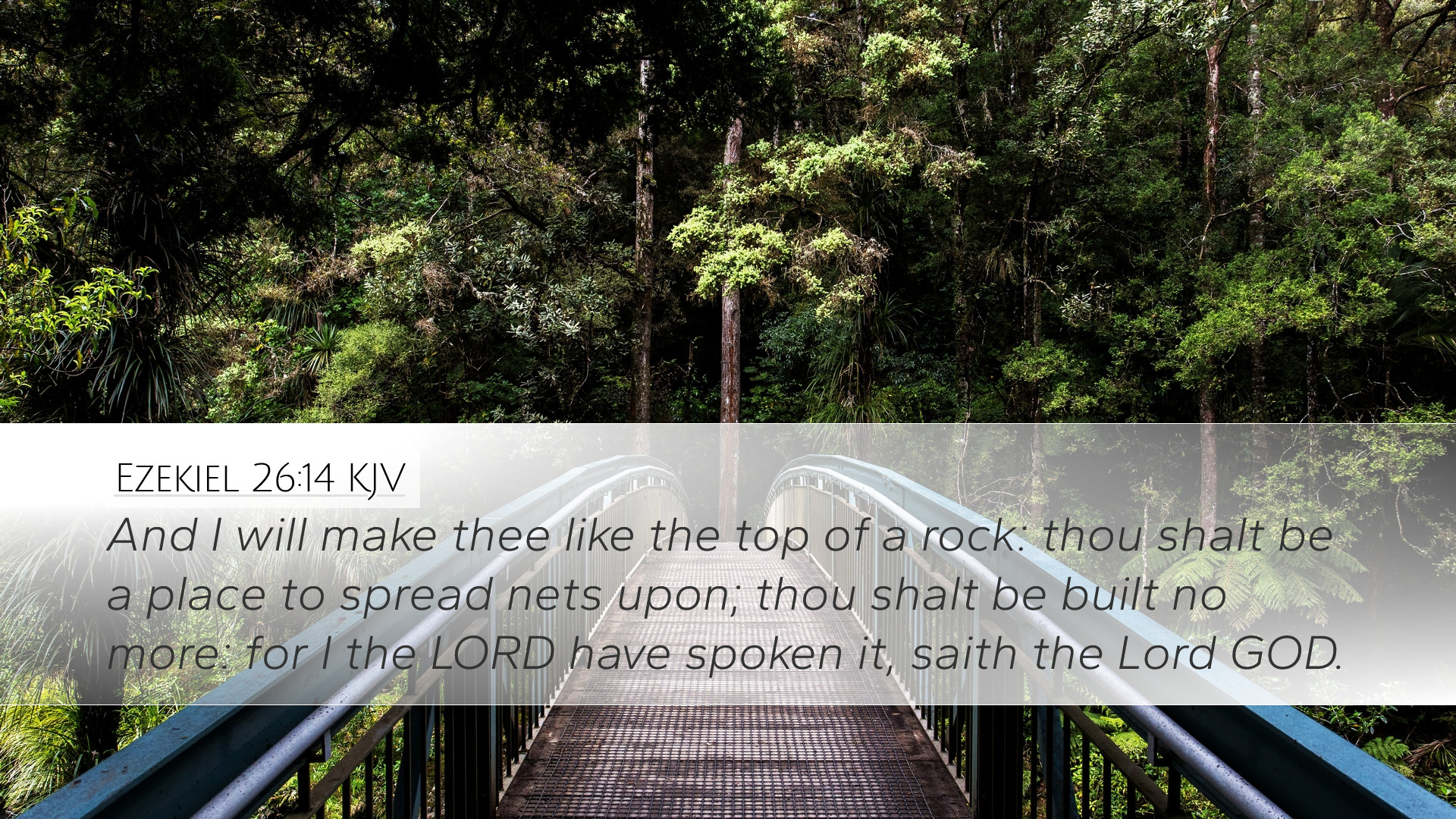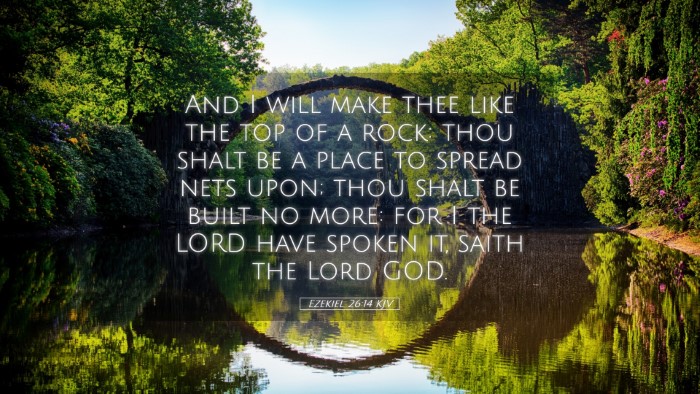Ezekiel 26:14 Commentary
Verse Text: "And I will make thee like the top of a rock: thou shalt be a place to spread nets upon; thou shalt be built no more: for I the Lord have spoken it, saith the Lord God." (Ezekiel 26:14, KJV)
Introduction
The prophecy of Ezekiel concerning Tyre serves as a profound message regarding divine judgment and the transient nature of human pride and power. This verse, Ezekiel 26:14, encapsulates the fate of Tyre, a city renowned for its wealth, trade, and fortifications. The insights drawn from revered public domain commentaries by Matthew Henry, Albert Barnes, and Adam Clarke offer a deep understanding of the theological and historical implications of this passage.
Contextual Background
Ezekiel, a prophet during the Babylonian exile, conveys messages of judgment against various nations, including Tyre. The city had long been a dominant commercial power, boasting intricate trade networks across the Mediterranean. However, this prosperity led to arrogance and the neglect of God, prompting a prophetic word of destruction.
Matthew Henry's Perspective
Matthew Henry emphasizes that the judgment pronounced against Tyre signifies not merely the destruction of a physical city but also the downfall of pride and self-sufficiency that is displeasing to God. He interprets "like the top of a rock" as a metaphor for barrenness; the once-vibrant city will be reduced to a place where only fishermen cast their nets.
- Divine Decrees: Henry notes that when God speaks judgment, it is irrevocable. The divine decree signifies the end of Tyre's glory and prosperity.
- Symbol of Desolation: The imagery of a barren rock suggests total desolation, resonating with the divine promise that Tyre "shall be built no more." Henry warns that humanity’s pride will ultimately lead to ruin when it stands against divine will.
Albert Barnes' Analysis
Albert Barnes provides a detailed examination of the historical and prophetic significance of this verse. He connects the prophecy to Tyre’s eventual downfall, affirming God’s sovereignty over nations and cities. Barnes notes that the fishing nets spread upon the rocks indicate the utter abandonment of Tyre’s grandeur.
- Fulfillment of Prophecy: Barnes articulates the historical events that led to Tyre’s decline, particularly the sieges by Nebuchadnezzar and later Alexander the Great, which fulfilled Ezekiel's words.
- Contrast Between Man’s Works and God’s Will: Tenacious stability in human endeavors is contrasted with the certainty of God’s intentions, reaffirming the principle that divine purposes will prevail over human plans.
Adam Clarke's Insights
Adam Clarke's commentary illuminates the broader implications of the prophecy. He elucidates that Tyre's fate serves as a warning to all nations that rely on their own strength rather than revering God.
- Moral Reflection: Clarke draws attention to the moral lessons embedded in the prophecy, urging that reliance on material wealth can lead to spiritual blindness and consequence.
- Significance for Israel: He also highlights that the judgment against Tyre is not just about Tyre itself, but also holds significance for Israel, as Tyre’s fall represents an assurance of God’s justice and sovereignty over those who have wronged His people.
Theological Implications
The implications of Ezekiel 26:14 extend beyond historical context. Theological reflections include:
- God’s Sovereignty: The prophecy emphasizes God's sovereign control over human affairs. The assurance that He will dismantle the proud and self-reliant serves as a reminder of divine authority.
- Human Pride and Humility: The lesson of humility before the Almighty is poignant. The fate of Tyre warns against the idolatry of riches and power, calling for a posture of dependency on God.
- Judgment and Restoration: The passage speaks to the broader biblical theme of judgment leading to eventual restoration. While Tyre’s destruction is foretold, the hope in God's plan underscores the cyclical nature of sin and redemption.
Conclusion
Ezekiel 26:14 stands as a powerful prophetic pronouncement with rich theological import. The combined insights from Matthew Henry, Albert Barnes, and Adam Clarke reveal layers of meaning about divine judgment, human pride, and ultimate hope in God’s sovereignty. For pastors, students, theologians, and scholars, this verse encourages deep reflection on the nature of God’s character and the importance of aligning human endeavors with divine purpose.


